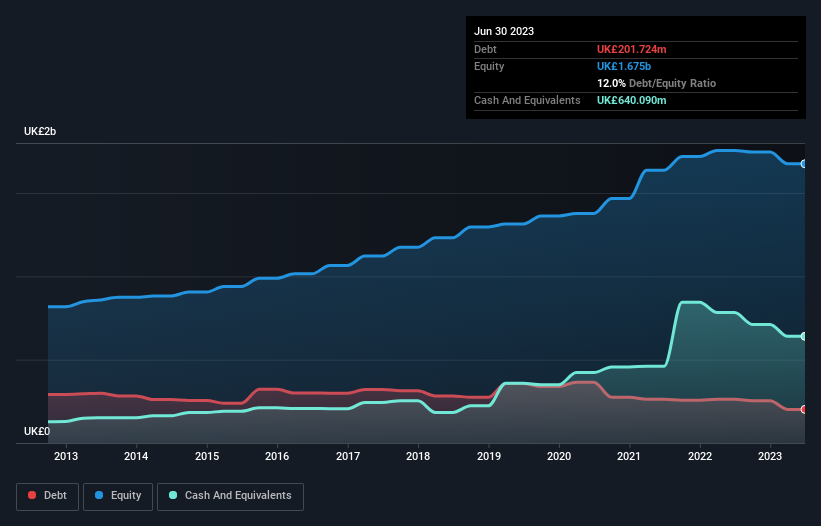- United Kingdom
- /
- Trade Distributors
- /
- LSE:GFTU
Does Grafton Group (LON:GFTU) Have A Healthy Balance Sheet?
Warren Buffett famously said, 'Volatility is far from synonymous with risk.' It's only natural to consider a company's balance sheet when you examine how risky it is, since debt is often involved when a business collapses. We note that Grafton Group plc (LON:GFTU) does have debt on its balance sheet. But is this debt a concern to shareholders?
When Is Debt Dangerous?
Debt is a tool to help businesses grow, but if a business is incapable of paying off its lenders, then it exists at their mercy. In the worst case scenario, a company can go bankrupt if it cannot pay its creditors. While that is not too common, we often do see indebted companies permanently diluting shareholders because lenders force them to raise capital at a distressed price. By replacing dilution, though, debt can be an extremely good tool for businesses that need capital to invest in growth at high rates of return. The first thing to do when considering how much debt a business uses is to look at its cash and debt together.
Check out our latest analysis for Grafton Group
How Much Debt Does Grafton Group Carry?
The image below, which you can click on for greater detail, shows that Grafton Group had debt of UK£201.7m at the end of June 2023, a reduction from UK£262.2m over a year. But on the other hand it also has UK£640.1m in cash, leading to a UK£438.4m net cash position.

A Look At Grafton Group's Liabilities
The latest balance sheet data shows that Grafton Group had liabilities of UK£564.0m due within a year, and liabilities of UK£661.0m falling due after that. Offsetting these obligations, it had cash of UK£640.1m as well as receivables valued at UK£293.2m due within 12 months. So it has liabilities totalling UK£291.6m more than its cash and near-term receivables, combined.
Given Grafton Group has a market capitalization of UK£1.83b, it's hard to believe these liabilities pose much threat. However, we do think it is worth keeping an eye on its balance sheet strength, as it may change over time. While it does have liabilities worth noting, Grafton Group also has more cash than debt, so we're pretty confident it can manage its debt safely.
But the bad news is that Grafton Group has seen its EBIT plunge 12% in the last twelve months. If that rate of decline in earnings continues, the company could find itself in a tight spot. The balance sheet is clearly the area to focus on when you are analysing debt. But it is future earnings, more than anything, that will determine Grafton Group's ability to maintain a healthy balance sheet going forward. So if you want to see what the professionals think, you might find this free report on analyst profit forecasts to be interesting.
Finally, while the tax-man may adore accounting profits, lenders only accept cold hard cash. Grafton Group may have net cash on the balance sheet, but it is still interesting to look at how well the business converts its earnings before interest and tax (EBIT) to free cash flow, because that will influence both its need for, and its capacity to manage debt. Over the last three years, Grafton Group recorded free cash flow worth a fulsome 97% of its EBIT, which is stronger than we'd usually expect. That puts it in a very strong position to pay down debt.
Summing Up
Although Grafton Group's balance sheet isn't particularly strong, due to the total liabilities, it is clearly positive to see that it has net cash of UK£438.4m. And it impressed us with free cash flow of UK£211m, being 97% of its EBIT. So we don't have any problem with Grafton Group's use of debt. The balance sheet is clearly the area to focus on when you are analysing debt. However, not all investment risk resides within the balance sheet - far from it. For example - Grafton Group has 1 warning sign we think you should be aware of.
At the end of the day, it's often better to focus on companies that are free from net debt. You can access our special list of such companies (all with a track record of profit growth). It's free.
New: Manage All Your Stock Portfolios in One Place
We've created the ultimate portfolio companion for stock investors, and it's free.
• Connect an unlimited number of Portfolios and see your total in one currency
• Be alerted to new Warning Signs or Risks via email or mobile
• Track the Fair Value of your stocks
Have feedback on this article? Concerned about the content? Get in touch with us directly. Alternatively, email editorial-team (at) simplywallst.com.
This article by Simply Wall St is general in nature. We provide commentary based on historical data and analyst forecasts only using an unbiased methodology and our articles are not intended to be financial advice. It does not constitute a recommendation to buy or sell any stock, and does not take account of your objectives, or your financial situation. We aim to bring you long-term focused analysis driven by fundamental data. Note that our analysis may not factor in the latest price-sensitive company announcements or qualitative material. Simply Wall St has no position in any stocks mentioned.
About LSE:GFTU
Grafton Group
Distributes and sells building materials and construction related products in Ireland, the United Kingdom, the Netherlands, Finland, and Spain.
Very undervalued with flawless balance sheet and pays a dividend.
Similar Companies
Market Insights
Community Narratives



